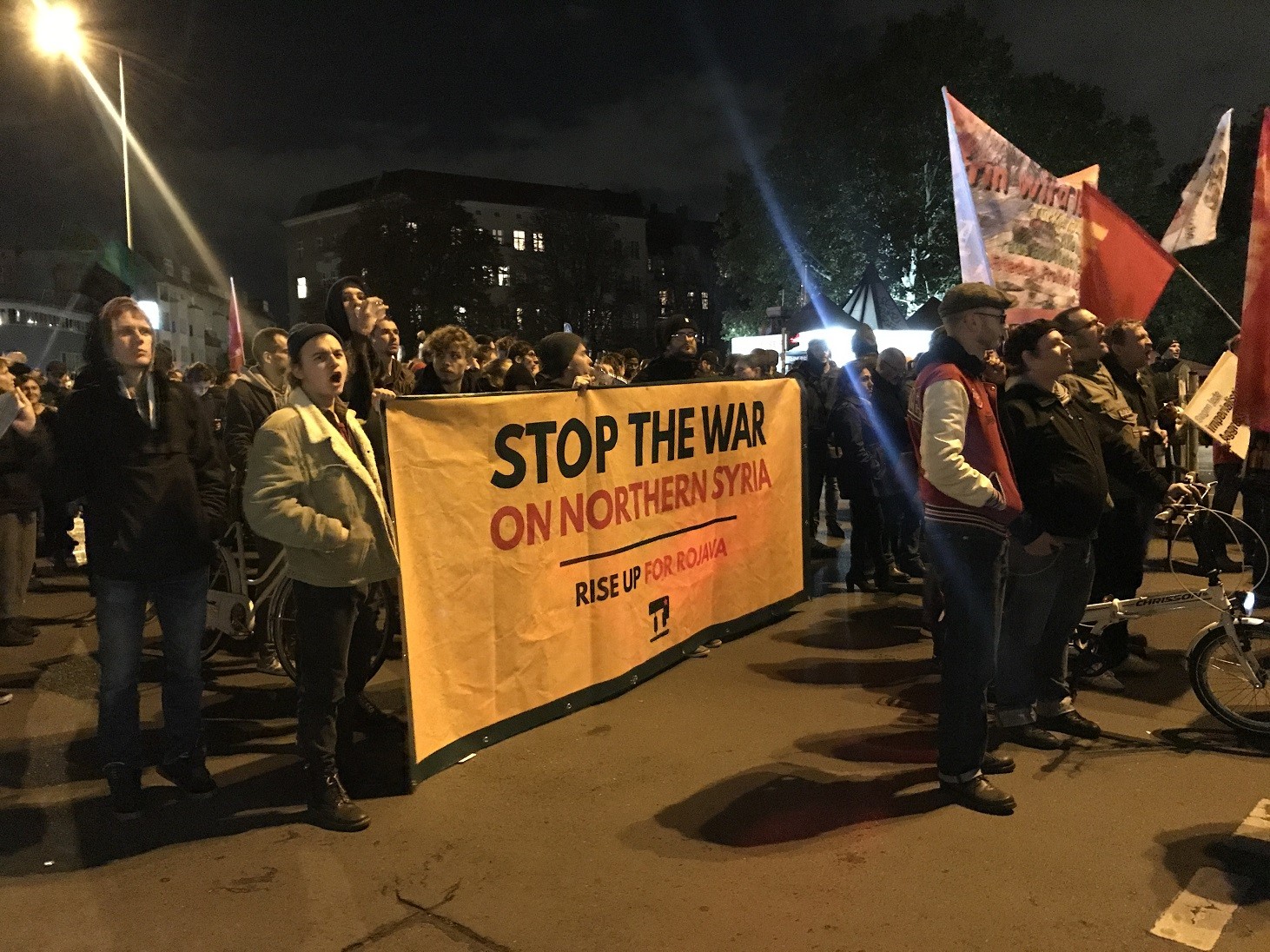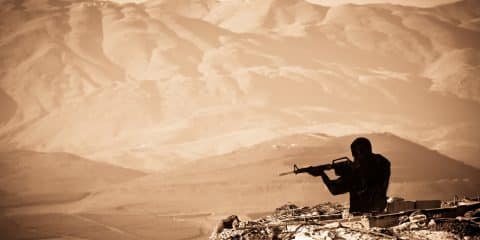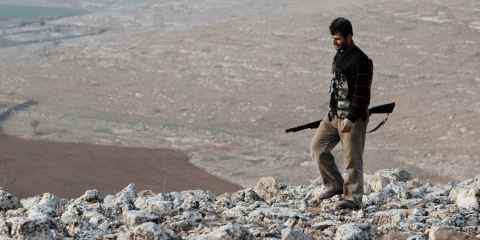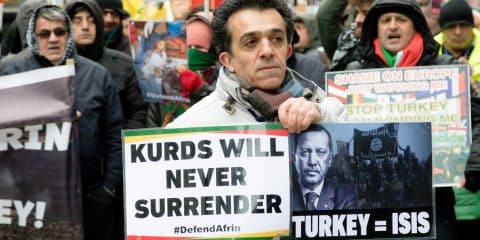What Can and Should Be Done to Limit the Scope of the Turkish Assault on Rojava?
Moral outrage, however justified, is not policy. For Israel and for all like-minded forces in the region, it is important to find ways to limit the scope of Erdogan’s attack on the semi-independent region of Rojava (the Kurdish term for north-eastern Syria). The alternatives – which involve unbridled Turkish ambition, a Kurdish turn towards Iran, and/or a resurgent Islamic State – are intolerable. Hence, it is the Western interest to induce Turkish restraint.
This should involve territorial red lines; the threat of economic and NATO sanctions; and the possibility of significant arms supplies to the SDF – if the Turks lines do not cooperate. Backed by deft diplomacy, these moves can lead to de-escalation and constrain the Turkish incursion, limiting the damage.
President Trump’s decision to withdraw the small contingent of US troops deployed along the Turkish-Syrian border is widely viewed as a “green light” for the Turkish invasion of northern Syria, which had been planned for some time. Air attacks, artillery barrages and limited action on the ground soon followed. It remains to be seen how deep inside Syria Erdogan intends to go. The Turks have spoken in the past about a 30 kilometer “cordon sanitaire,” which could involve intense fighting, high losses and immense human suffering and dislocation.
This turn of events has aroused anger and condemnation worldwide. The outrage is well justified. Those who stood and fought bravely, men and women, Kurds, Yazidis and Christians like, and turned the tide of Islamic State horrors at the battle of Kobani in 2014-2015, do not deserve to be betrayed in this fashion. Strong Republican voices, including those who firmly supported the President’s decisions on most issues, have been raised in protest. A rare commonality has emerged among key regional players – Egypt, Saudi Arabia and Israel – alongside a broad spectrum of European leaders. (But note: Netanyahu’s criticism of the Turkish actions (and his promise of humanitarian aid to the Kurds) fell short of overt criticism of Trump and of the Kurds’ real needs at this time). For many around the globe, and even more so in the region, the moral dismay was exacerbated by profound concern about the style and substance of some of Trump’s statements, and about what seems to be a chaotic policy process in Washington.
However, moral outrage and intellectual dismay do not constitute policy. (This is true also in Israel, where the problem is compounded when outrage is used as a tool in the bitter political and personal struggle for power in the wake of Israel’s inconclusive elections). Clear and coherent policy is required. The prospect of prolonged and destructive fighting between the SDF and the large armed forces of a NATO ally is bound to bring with it disastrous consequences for Israel and others in the region. Three major concerns emerge:
- The SDF will fight on, and despite the denunciation of “America’s agents” by the Syrian regime, the emerging situation may increasingly push them into the arms of Assad and his Iranian backers. This, in turn, would make the position of the remaining US troops in places like Tanf practically untenable, and greatly facilitate Iran’s project of building a land bridge to Lebanon, the Mediterranean, and Israel’s borders.
- With all energies turned to the battle with the Turks, the willingness and ability of the SDF to maintain the fight against what is left of the Islamic State (or even hold on to their catch of some 11,000 Da’esh prisoners, many of them complicit in horrific acts of terror) is bound to weaken. Indeed, this already may be in question, as American authorities have been quick to realize (and ferret away some particularly dangerous elements).
- More generally, in conjunction with the question marks surrounding the decision not to respond militarily to the Iranian attack on the ARAMCO facilities in Saudi Arabia, Trump’s conduct sent a shiver of concern through the spines of Israelis and Arabs alike. It was rare to find a defender of his actions and choices even among his staunch advocates. The sense that loyal allies are being abandoned to their fate can have strategic as well as moral consequences.
What is now required is coordinated policy, pulling-in elements of Trump’s own frustrated tweets, of the firm Republican and Democratic reactions in Congress, of the expressions of European concerns and of the angry regional responses – all aimed at limiting the scope of Turkish action. Rojava, somewhat reduced but still alive and proud – and of significant utility in the complex Syrian drama, which is far from over – can still be saved.
Erdogan’s political needs, made more acute by his humiliating electoral loss in Istanbul this summer, have driven him to take military action. He is acting to reposition the AKP as the standard-bearer of both Turkish nationalism and the Islamist agenda (to which the YPG in Rojava is fiercely opposed). But a broader look at Turkey’s place in the world, and the concern for preserving the impressive economic position that has so far kept the AKP in power, could induce Erdogan to settle for less than he originally envisioned. On this, at least, Trump’s instincts may not be misguided, even if his choice of language could have been wiser.
What should be the building blocs of this strategic initiative? Four elements stand out:
- Clear red lines, translating Trump’s talk of “breaking the rules” into action. The Turkish forces, let alone their dangerous Islamist Sunni allies on the ground (not only FSA but Jabhat al-Nusra and their likes), should stay well away from significant population centers, and the geographical scope of their incursion should be curtailed. This could possibly lead to an agreed Line of Control.
- US and European policies need to reflect Trump’s blunt threat of economic ruin, backed by Congressional legislation and similar messages from Brussels and key European capitals. Erdogan’s despicable threat to dump 3.6 million Syrian refugees into Europe is not implementable, and his bluff should be called.
- The US, Canada and Europe should in parallel prepare to make the necessary changes within the NATO system (– which has no procedures for removing a member) to isolate the Turkish military and intelligence community and deny them access to important fields of knowledge.
- Ankara should also face the prospect of the SDF being provided with specific weapon systems, including anti-tank and anti-aircraft capabilities, if (and only if) the red lines are crossed. This is a risky proposition, but so would be the escalation of the fighting in Rojava. The sooner that Turkish commanders have a reason to exercise caution, the better.
All this should be backed by deft diplomatic work – talking, as Trump has said, with all sides. Israel was right at the time to pay the price to keep a channel of communications with turkey open. While taking dangerous and even outrageous actions, Turkey is not an enemy as such. It does have a lively public debate, despite Erdogan’s effort to drown such by a populist call to arms. Turkey’s defense professionals should be offered a way to re-consider the true interests of their country and tailor the purposes of their current actions accordingly.
JISS Policy Papers are published through the generosity of the Greg Rosshandler Family.
photo: Marsupium [CC BY 4.0]









 - בניית אתרים
- בניית אתרים